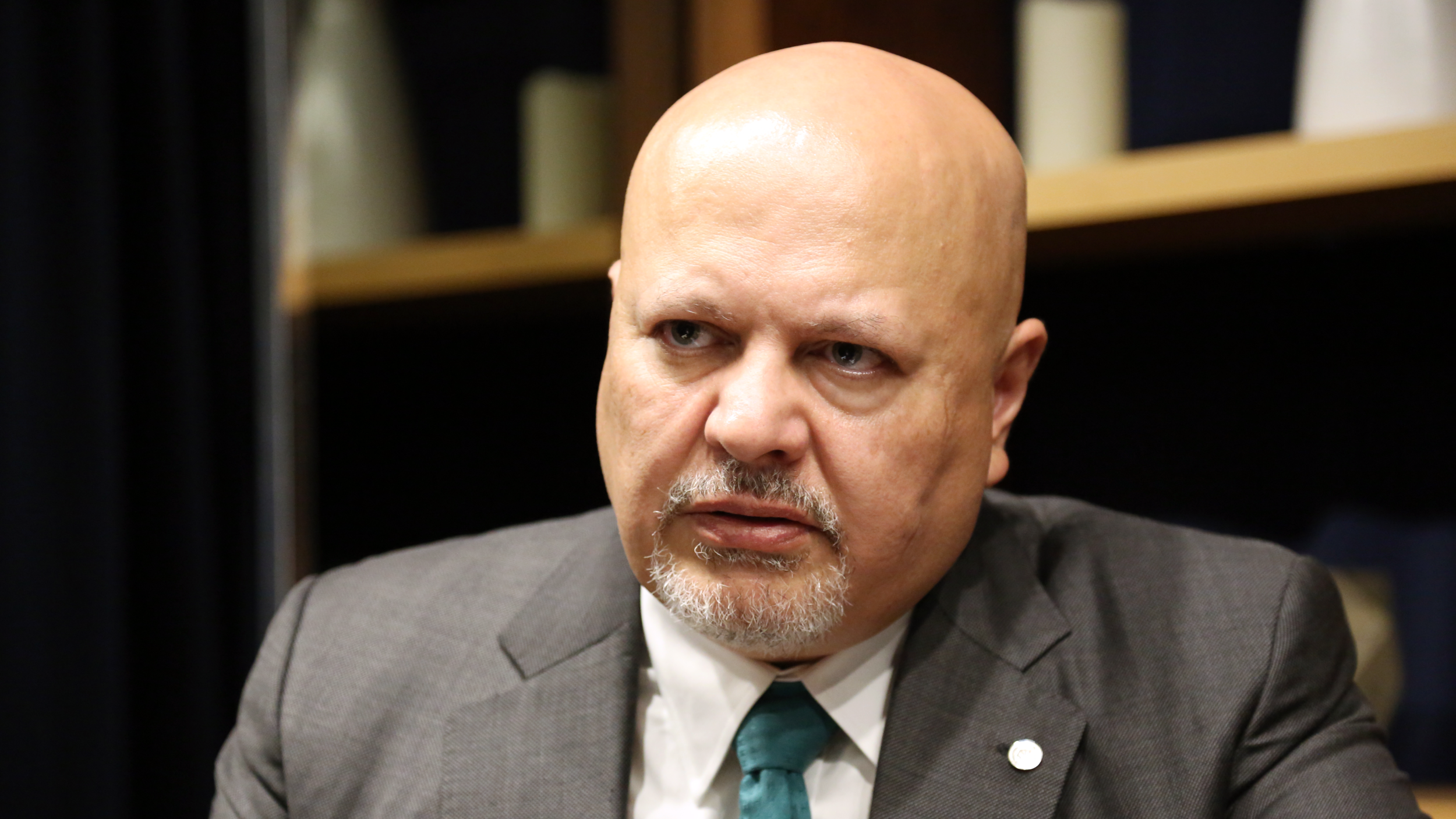World
Exclusive: ICC prosecutor sees risk of world war if global justice fails

The International Criminal Court’s (ICC) chief prosecutor warned during an exclusive interview that a continuation of attempts to undermine international law worldwide could set the stage for another global conflict.
Speaking to Newsweek on the sidelines of the United Nations General Assembly in New York, ICC Prosecutor Karim Khan recalled the horrors of World War II and the aftermath that paved the way for international tribunals and ultimately led to the establishment of the ICC at The Hague in 2002.
“I think when you can really pause for thought and then…it’s a very somber moment, you realize, when you look at and cast your mind to Nuremberg and those pictures of starving people in the gas chambers, people denied food and water and were not considered human by the fascists,” Khan said.
Renae Whissel/Newsweek
“It’s a very solemn promise this United Nations made in its beautiful preamble and in the Charter, in the Universal Declaration of Human Rights, a promise to future generations to be safe from the scourge of war,” he added. “We’ve got a lot of work to do. Finally, are we going to just live with the constant stream of broken promises until the next atrocity, when we say, ‘What lessons will we learn?’ and ‘Never again?'”
But he warned, “we don’t have time, because there is this crisis of confidence at the moment,” not only in the ICC as it resists pressures to pursue cases on polarizing conflicts such as the ongoing wars in Ukraine and Gaza, but in the entire premise of states fulfilling their commitment to marginalized peoples.
Now, he argued, the world is in a “position of peril internationally, and we have a choice: Do we want peace for our children, or do we want wider and wider conflagrations?”
Khan went on to recall the words of Polish Prime Minister Donald Tusk, who told the LENA European media network in May that, in what the former European Council president described as conditions not witnessed since World War II, “we are in a prewar era.”
“What are we going to do in terms of trying to avoid that calamity?” Khan asked. “The law will not do it all by itself, but it’s a very important part to try to adhere to the greater fidelity that has been seen in the past.”
Khan’s remarks came as the ICC faced threats of reprisal from a number of U.S. lawmakers over its attempts to investigate Israeli Prime Minister Benjamin Netanyahu and Defense Minister Yoav Gallant over suspected war crimes committed during the ongoing war in Gaza.
President Joe Biden‘s administration has joined its ally in rejecting ICC jurisdiction on the matter as Israel and the U.S. are not state parties to the court’s founding Rome Statute and both dispute Palestinian state signatory status.
Israel and Hamas have regularly accused one another of serious misconduct throughout the conflict but have denied being responsible for atrocities themselves.
Biden lifted sanctions issued by former President Donald Trump against ICC personnel over prior attempts to investigate Israel in regard to the situation in the Palestinian territories as well as the U.S. over suspected violations of international law committed throughout the war in Afghanistan. Yet the State Department signaled openness in May to working with Congress to issue a response to the ICC’s investigation into Israel.
Khan took note of the pressures being exerted by U.S. senators. At the same time, he credited the U.S. with its support for prior cases tried by international judiciaries, from the Nuremberg Trials to the tribunals in the former Yugoslavia and Rwanda and even the ICC itself.
“I hope the United States will live up to the best version of itself in terms of the application of the law,” Khan said. “And I think clearly you see around the world, in the Global South, people are wanting United States leadership.
“But that requires an ability to do what’s right, not only when it’s easy, but to do right when it’s difficult,” he added. “And I think that is why these cases sometimes are very difficult.”
The ICC has also opened an investigation into Hamas, naming three of the top leaders of the Palestinian movement that launched a massive attack on Israel last October. One of those men, Political Bureau chief Ismail Haniyeh, was killed during a yet unclaimed attack in Tehran in July that was widely attributed to Israel, while another, Al-Qassam Brigades commander Mohammed Deif, was declared dead by the Israel Defense Forces (IDF) after an airstrike in Gaza.Yahya Sinwar, formerly the group’s Gaza chief and now successor to Haniyeh, remains at large.
Should arrest warrants be issued against Sinwar, Netanyahu and Gallant, it would obligate the current 124 state parties to the Rome Statute to apprehend them. While Sinwar is more unlikely to travel to nations, Netanyahu has made numerous trips to Rome Statute state parties, especially in Europe.
But countries also take into consideration national interests when mulling over the potential consequences of apprehending indicted individuals, particularly heads of state and those leading or backed by major world powers.
Russian President Vladimir Putin became the first head of a permanent U.N. Security Council member to be issued an arrest warrant by the ICC in March of last year over suspicions of international law violations committed since he launched a war against neighboring Ukraine in February 2022. While Putin opted to appear only virtually at a summit held last August in ICC member South Africa, he went forward this month with a visit to Mongolia, also a state party to the Rome Statute, without incident.
Mongolia, which lies landlocked between Russia and China, is heavily dependent on imports from Russia, which is the source of up to 95 percent of its petroleum products.
Moscow, also not a state party to the Rome Statute, has denied systematic wrongdoing throughout the conflict in Ukraine and has taken note of Washington’s opposition to any ICC investigations concerning the U.S. and its allies, including Israel. Following Putin’s visit to Mongolia, Russian Foreign Minister Sergey Lavrov slammed what he called “a false narrative” and “double standards” being promoted by the West when it comes to which cases the court should and should not pursue.
Khan, for his part, saw it as a “positive” that “President Putin hasn’t set foot in any state party except Mongolia” since his arrest warrant was issued a year and a half ago. The ICC chief prosecutor urged “all state parties to fulfill their international obligations.”
The alternative, he warned, is a “wild west” that would allow impunity for individuals and nations to carry out their agendas without fear of legal repercussion, a reality he warned could lead to serious, potentially disastrous consequences for the world order.
“If it’s true that we want to avert ourselves from even greater catastrophes, we have to cling to something, and the law is one of the life rafts that we need to get on board,” Khan said. “Otherwise, we’ll drown together.”









